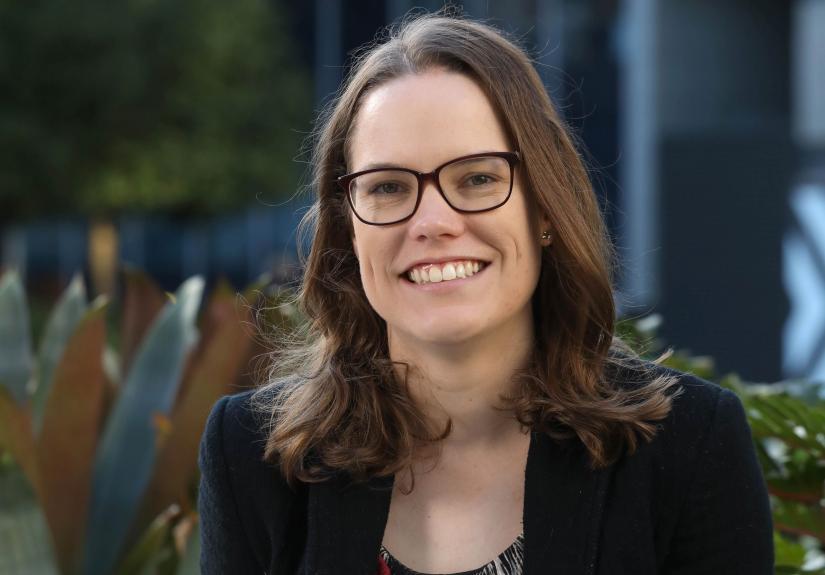Ashley Crook joins the team as the inaugural PhD candidate

Ashley Crook is the latest addition to the Graduate School of Health’s Genetic Counselling discipline. Ashley is an experienced genetic counsellor with over seven years of experience in a variety of roles – including familial cancer, adult neurology, prenatal and general genetics, clinical and research genetic counselling.
Originally from Melbourne, Ashley studied a Bachelor of Arts and Bachelor of Science at Monash University with majors in Indonesian, human geography and genetics. During her studies, she volunteered with young adults from refugee backgrounds and assisted in providing support and advice on job seeking and day-to-day living in Australia.
It was here where she first discovered her passion for working with people, and her genetic counselling journey began, studying a Master of Genetic Counselling at the University of Melbourne. Here, Ashley gained research experience working on a sub-study of the Australian Ovarian Cancer Study where she interviewed individuals at high risk of having a cancer gene mutation in their family.
In 2017, Ashley received a grant to research genetic counselling and genetic testing decision-making for inherited motor neurone disease in Australia. This has now led her to the research she will be conducting for her PhD at the Graduate School of Health, focusing on familial amyotrophic lateral sclerosis/motor neurone disease and frontotemporal dementia and new genetic counselling models of care. Ashley has also received a Chancellor's Research Scholarship to support her studies.
We talked to Ashley to hear more about her journey and research at UTS Genetic Counselling.
Why are you passionate about Genetic Counselling? Was there a light bulb moment when you realised that you wanted to focus on research?
This is a really exciting time to be a genetic counsellor. Genetic counselling is becoming more integrated into general healthcare, and more people are ordering genetic tests outside clinical genetics. We also have new uses for genetic testing for some conditions, such as to inform treatment or management options.
This is a really exciting time to be a genetic counsellor. Genetic counselling is becoming more integrated into general healthcare, and more people are ordering genetic tests outside clinical genetics.
Through my experience working in multidisciplinary teams, sometimes there is a need for additional education of other health professionals to ensure all aspects associated with a genetic result are considered, such as providing client-centred psychosocial support, communication of a result to other family members or the correct interpretation of a test result.
I expect that genetic counsellors in the future may become leading sources of advice and support for other health professionals who order genetic tests, but have less experience of the genetic counselling implications of testing.
I expect that genetic counsellors in the future may become leading sources of advice and support for other health professionals who order genetic tests, but have less experience of the genetic counselling implications of testing.
I've always had an interest in research and much of my clinical genetic counselling work has involved research, including collecting patient data for research studies, quality improvement projects and consenting clinic attendees to research. More recently, I have conducted my own qualitative research, and am currently coordinating a cancer screening trial in Neurofibromatosis type 1.
What’s your research area about and what do you hope to achieve?
My project is titled “Genetic counselling and testing decision-making for familial motor neurone disease (MND) and/or frontotemporal dementia (FTD) in Australia: implications for practice.” I became interested in familial MND and FTD after gaining experience counselling these families through the genetic testing decision-making process.
Testing for these conditions is complicated by a number of different factors, including our limited understanding of the causative genes and their impact, the absence of treatment options, and the difficulty in estimating a mutation carrier’s risk of developing disease. There has been little research on how people from these families make decisions about genetic testing, and also the impact of the genetic condition on the family, and I hope to explore this further.
I am also going to review further different models of care for genetic counselling. Many familial MND and FTD families may be managed primarily by a neurologist and may have never met a genetic counsellor. In 2015, I helped to set up a genetic counselling service at a private neurology practice that sees many MND patients. These two service delivery models (where one’s genetic counselling is done by a non-genetics specialist only, or in a combined clinic with a non-genetics specialist and genetic counsellor) are newer models of care in genetic counselling.
With more genetic testing to be conducted outside of a clinical genetics service in future, it is important to review and consider different models of service delivery. This may help to ensure that care given to patients outside of a traditional genetic counselling setting causes no harm to patients.
Why did you join the Graduate School of Health’s Genetic Counselling discipline?
I have been working on the curriculum committee for the new Master of Genetic Counselling course at UTS, so was familiar with the team’s approach, which was future-focused. This is vital given how quickly the role and opportunities available to a genetic counsellor are changing. I was drawn to the Graduate School of Health as this is the first time in Australia that a PhD in genetic counselling is being formally offered, and it is an honour to be the inaugural PhD candidate.
Find out more about Genetic Counselling at UTS.

